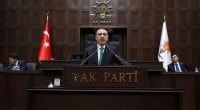Keyword: Defamation of Hizmet

Coup Commission members: Now is similar to Feb. 28 coup period
Members of the parliamentary Coup and Memorandum Investigation Commission, set up to investigate past coups, have said a number of anti-democratic moves begun after the launch of a wide-reaching corruption investigation, including the removal of thousands of civil servants and discrimination against members of a faith-based group, have said the practices are similar to what occurred in the run-up to the Feb. 28, 1997 unarmed coup.

MİT to monitor all religious groups as potential parts of parallel state
The National Intelligence Organization (MİT) recently sent a document in which all religious communities and groups within state institutions, described as “parallel state structures” (PDY) in the document, were cited as the main target to be monitored in 2014, the Taraf daily claimed on Friday. Analysts are concerned that the government’s attitude may take the form of a witch hunt that will undermine democracy.

Attempting to discredit Gülen by linking him to Israel
A typical example of black propaganda is the “anti-reactionaryism action plan” prepared in cosmic rooms with the intention of destroying the ruling Justice and Development Party (AK Party) and the Gülen community in 2009, which was initially denied and passed off as a “piece of paper,” but which led to the trial and sentencing of those who prepared it.

PM’s order echoes 2004 MGK decision [to undermine the Gulen Movement]
The prime minister’s order that Turkish ambassadors “tell the truth” to their foreign interlocutors about the corruption probe has brought to mind a controversial National Security Council (MGK) document indicating that Turkey’s ruling Justice and Development Party (AK Party) agreed to a planned crackdown on the Hizmet movement led by Turkish Islamic scholar Fethullah Gülen in 2004.

Opposition asks for parliamentary session on MİT wiretapping
Turkish Islamic scholar Fethullah Gülen will file a criminal complaint against those responsible for the illegal wiretapping of his phone conversations, Gülen’s lawyer Nurullah Albayrak said in a written statement on Tuesday.
Main opposition Republican People’s Party (CHP) İstanbul deputy Ferit Mevlüt Aslanoğlu called for a parliamentary session to inform the deputies about the technical details of wiretapping.

Ambassadors uneasy over Erdoğan’s orders concerning graft probe
Turkey’s ambassadors have expressed displeasure over Prime Minister Recep Tayyip Erdoğan’s remarks that called on them to “tell the truth” to their foreign interlocutors, saying that defending the government against corruption allegations in not the ambassadors’ business.

Gülen files criminal complaint over illegal wiretapping
Illegal wiretapping has been an issue in Parliament as well, as opposition parties have asked for a parliamentary session to address wiretappings carried out by the National Intelligence Organization (MİT). Main opposition Republican People’s Party (CHP) İstanbul deputy Ferit Mevlüt Aslanoğlu called for a parliamentary session to inform deputies about the technical details of wiretapping.

Reactions snowball after PM likens Hizmet members to Hashishin
According to Nationalist Movement Party (MHP) deputy Özcan Yeniçeri “The Hashishin was a separatist organization that inflicted great damage on the Turkish nation. Their purpose was to divide the nation and disrupt peace. The Hizmet movement, on the other hand, is a civilian initiative that strives for Turkey not to be divided and for youths not to fall into the hands of the terrorist PKK. For us, the real Hashishin are the separatists. If the prime minister is looking for a Hashishin, he should look into the mirror,”

Erdoğan, Hizmet, assassins
Former Interior Minister Idris Naim Şahin stated that “the government is run by a small oligarchic elite in a way that excludes broad segments of the party constituency and the Turkish people” is very explanatory vis-à-vis Mr. Erdoğan’s shockingly undemocratic and increasingly authoritarian performance over the last two years, since he received 50 per cent of the vote in the 2011 general elections.

Rule of law casualty of AKP-Gulen conflict
The AKP government thinks that by labeling corruption investigations and operations as a “coup” and calling those behind them as “parallel state” that it has found a justifiable way to interfere with the judiciary. Otherwise the government would not have submitted a draft bill to the parliament that totally eliminates the functional independence of the judiciary bureaucracy and promotes the minister of justice, who represents the executive branch, to the status of single decision-maker.

Turkish anti-terrorism police carried out raids in six cities, detaining at least five people with alleged links to al-Qaida
The police raid “is a deliberate attack on the IHH,” said Yasar Kutluay, the group’s secretary general. “They are trying to portray the group as an organization with links to terrorism.” He blamed Israel and Gulen’s supporters, for the operation — a charge Gulen’s movement immediately rejected as “slander and false incrimination.”





















